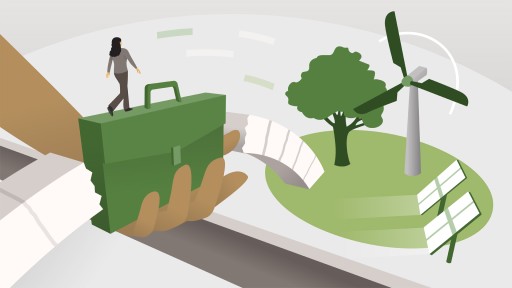Rise x LinkedIn Learning
LinkedIn learning offers over 16,00 skills-development courses, and you can access them all for free as part of your Man Met studentship (usual cost £29.99/month!)
And thanks to our exclusive partnership, you'll automatically earn Rise points for completing them.
Here's how to get started:
- Go to linkedin.com/learning-login
- Enter mmu.ac.uk - this step is important!
- Click Continue to The Manchester Metropolitan University
- Enter your username in the following format: MMUID@stu.mmu.ac.uk, eg. 12345678@stu.mmu.ac.uk
- Enter your usual university password
Note: Rise points will be automatically awarded at 7am each morning, based courses that you have fully completed in the previous 24 hours
The global business sector is being transformed around a common issue: environmental sustainability. Leaders should not only be prepared for the business transformations that lie ahead, but also be key architects of developing sustainability policies in the workplace.
Define green skills, jobs, and workforce opportunities.
Prioritize sustainability practices and other business needs.
Manage supply chains more responsibly and effectively.
When you’re done, you’ll have earned a certificate of completion: Sustainability Transformation for Leaders (linkedin.com).
Regardless of industry, the global business sector is being transformed around a common issue: environmental sustainability. Business leaders around the world are grappling with meaningful efforts to address climate issues relevant to their organizations. In this course, the chief environmental officer at Microsoft, Dr. Lucas Joppa, discusses some of the most pressing questions surrounding this critical topic. Dr. Joppa frames this course not around a set of rigid rules companies should follow, but through methods for individual companies to evaluate what strategies fit best and how to leverage existing strengths to make the biggest impact. By following just a few of the key principles and concepts Dr. Joppa lays out, companies can ensure that they are not only prepared for the business transformations that lie ahead, but are key architects of it, leading the way on a vital issue.
A changing climate compels us to change the way we do business. Incorporating sustainability into your business can help your bottom line and build your company's brand. This course shows how to adopt smart sustainability practices to drive financial performance, attract and retain employees, and protect your company's license to operate. David Bennell outlines how to establish your reputation as a company focused on sustainability, manage supply chains more responsibly and effectively, create sustainable products and services, and reduce energy use, waste, toxic substances, and emissions. Last, he helps you figure out how to track key metrics, assess your company's carbon footprint, and improve your environmental, social, and governance (ESG) practices.

As nations and industries worldwide make commitments toward a more environmentally sustainable future, many questions must be considered. How can our economies grow more thoughtfully, focus on sustainability, and counteract climate change while also providing new opportunities for the global workforce? In this course, Sue Duke, LinkedIn Vice President, Head of Global Public Policy and the Economic Graph Team, examines how the world of work is changing to adapt to the green economy, what jobs and skills are on the rise, how sectors and countries are adapting to focus on sustainability, and what leaders need to do to prepare their workforces. Adapting to this new economy may seem daunting, but the good news is that a green economy is not only good for the planet—it can also create new opportunities. If you’re looking for practical advice about what you, your organization, businesses, and governments can do to embrace and take advantage of this rapid economic shift, join Sue in this course.
Sustainability is quickly becoming a must-have in business—a technical skill set that employees, managers, and executives need to gain deeper understanding and build capacity to grow. It’s a way of thinking about how you use, value, and respect a world of shared but finite natural resources that we all depend on to create the products and services we use. In this course, LinkedIn Changemaker and UNEP Champion of the Earth Leyla Acaroglu gives you an overview of why sustainability matters to business as an opportunity to innovate and grow. Learn about sustainability and the circular economy with examples of how it impacts business decisions and daily life, including waste, product lifecycle, supply chains, and procurement, to name a few. Explore the emerging world of circular redesign and what it means to operationalize it for a business. Leyla gives you practical tips to take action, motivate others, and inspire sustainable innovation in product development and business design.
In this course, instructor Fulya Kocak Gin explains what the environmental, social, and governance (ESG) umbrella encompasses, why there is an increasing momentum around ESG, why corporations are expected to address their impact in environmental and social aspects of their businesses, and how governance plays into these efforts. Fulya covers foundational concepts under each one of the E, S, and G areas. She connects the dots between traditional social responsibility and sustainability projects and business performance, sustainable investing, and risk management.
Sustainability is a major concern across all realms of commerce these days. And as it turns out, the majority of greenhouse gas emissions are found in the supply chain: Product sourcing, manufacturing, distribution, and delivery have a huge impact on air, soil, and water. So when it comes to sustainability, it’s largely the responsibility of supply chain professionals to identify areas of impact where small changes can make a big difference. In this course, Sarah Barnes-Humphrey shares case studies, real world examples, and lessons from her 20 years of experience to give you practical advice on what you need to do to start building an effective and measurable sustainability plan that your whole business buys into. As Sarah shows, a thorough sustainability program won’t only have a positive environmental impact, it also touches on areas like human rights, ethical labor practices, and anti-corruption. Plus, it can reduce costs, create efficiency, mitigate risk, and increase brand value.
 //REWORK THIS
//REWORK THIS












